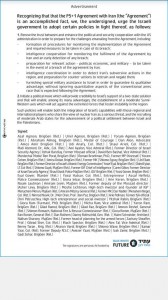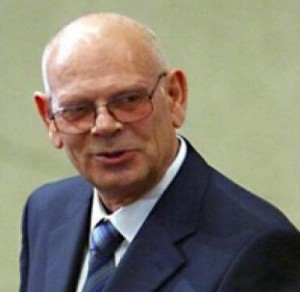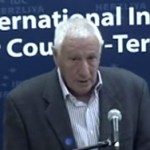Some are suggesting that Israeli national security experts are uniformly opposed to the Iran deal and support Netanyahu's efforts to block its implementation. In reality, there are more complex, nuanced views in Israel, as in the United States.
We will update this page regularly with new articles and statements from former Israeli military and national security officials and Israeli nuclear experts.
On 8/17, YNet published an article entitled "IDF Intelligence: Deal could help rein in Iran's terrorist activities". The article noted:
"While Prime Minister Benjamin Netanyahu has been leading a campaign against the Iran nuclear deal, IDF Intelligence has pointed to possible benefits to Israel as a result of the agreement. The IDF Military Intelligence Directorate's Research Department recently presented its stance on the deal to the political leadership, and along the risks and problems – which Israel has pointed out many times – it mentions a number of opportunities and positive possibilities that the deal can lead to. While noting that the risks are greater than the rewards, Military Intelligence emphasized the possible positives that could come of the deal. Primarily, that Iran will not have military nuclear capabilities in the coming few years. In addition, the United States is currently negotiating with Iran over different security issues relating to the Middle East. The Research Department went on to say that the deal might also rein in Iran and stop it from performing terrorist acts against Israel, such as bombing embassies..."
In an unprecedented move, on August 13, 2015, the IDF Chief of Staff Gadi Eisenkot released a document to the public on Thursday defining and detailing the army's national security strategy. Notably, the document include no mention of the Iranian threat. Haaretz observed that the document can be seen as "Eizenkot’s doctrine" and notes that the document lays out that
"After peace with Egypt and Jordan, with Syria next in line as a “failed, disintegrating state” and with nuclear Iran on vacation until 2025, Israel’s main enemies today, according to the document, are the Islamist organizations – Islamic State, but especially Hezbollah and Hamas, although the abilities being developed and their implementation are intended in large part to meet the challenge of battle against armies and states...Iran is mentioned as supporting Hezbollah and Hamas, not as a nuclear threat."
YNet commented:
"The Iranian nuclear threat, which is presented by the political leadership as the biggest existential threat Israel is facing, is not mentioned - possibly because the army's strategy on that issue is too classified to appear in a public document, or because the agreement signed between Iran and world powers is seen as mitigating the threat."
Dozens of retired Israeli generals urge Netanyahu to accept Iran deal a fait accompli
an d now move to repair ties with the United States.
d now move to repair ties with the United States.
“Recognizing that the P5+1 Agreement with Iran (the “Agreement”) is an accomplished fact, we, the undersigned, urge the Israeli government to…Renew the trust between and enhance the political and security cooperation with the US administration in order to prepare for the challenges emanating from the Agreement…”
Shemuel Meir, a former Israel Defense
Forces analyst and an associate researcher at the former Jaffee Center for Strategic Studies at Tel Aviv
University:
"The agreement contains important positive implications for Israel’s security. Above all, it prevents Iran’s emergence as a new nuclear-weapon state in the Middle East. Nuclear weapons are in a different, higher league than all other weapons; they alone are definable as an “existential threat.” This potentiality is blocked definitively by the understandings reached in Vienna. They prevent a serious erosion of the NPT and help strengthen and consolidate the global regime for the prevention of nuclear weapons – of which Israel, which is not a signatory to the NPT, is one of the main beneficiaries."
Maj. Gen. (Ret.) Amram Mitzna, former MK and former Mayor of Haifa:
“Nearly ever
y day since the nuclear agreement with Iran was finalized, more Israeli generals and security chiefs have come forward with the same message: The deal is surprisingly good for Israel’s security. And as a retired major general who oversaw many elements of the Israeli military, I feel it is my duty to join my colleagues. No agreement is perfect, and defenders of the deal should not sugarcoat its serious implications. But as head of IDF operations and planning, I learned well the capabilities and also the limits of military power. And I saw firsthand the enormous security benefits that can be achieved through diplomacy. I must state loud and clear — this agreement is better than no agreement and must not be rejected. If implemented, it will block all of Iran’s pathways to a nuclear weapon, and extend the time Iran would need to build a bomb from only two months to more than a year.”
Prof. Uzi Even, physics
professor at Tel Aviv University; formerly served as a scientist at the Dimona reactor, in YNet:
“The agreement that was signed between the powers and Iran delays the Iranian nuclear program by 15 years at least, and maybe more. The deal was written by nuclear experts and blocks every path I know to the bomb. The Iranians may be celebrating, but they have in fact swallowed a very bitter pill, more so than they would like to let on.”
Chuck Freilich, former deputy national security adviser in Israel, in the New York Times:
"...this is
the agreement that was reached — and despite its faults, it is not a bad one. Crucially, it will contribute to Israel’s security. For at least the next decade, Israel will not have to live under the threat of a nuclear Iran and will not face the danger of annihilation. For Israel, that is a major achievement. It will enable Israel to divert precious resources to more immediate threats, like Hezbollah’s more than 130,000 rockets, Hamas and the Islamic State, and no less important, to pressing domestic needs. No agreement is ironclad, but the inspections provisions provide a high degree of confidence that Iran will not be able to renew the nuclear program without its being detected. A regime that has staked so much on this agreement will be reluctant to incur the costs."
And in the Bulletin of Atomic Scientists:
“Netanyahu’s intention to take the fight to Congress and to challenge a president’s biggest foreign policy initiative on his home turf would be sheer lunacy on any other topic and is misguided on this one. …It is time for the prime minister to accept that this is the deal and to do what he should have done from the beginning: engage with the administration on the means of minimizing the threat to Israel and maximizing Israel’s contribution to the agreement’s successful implementation. Israel has intelligence capabilities and experience that can be invaluable in the years to come.”
Efraim Halevy, former head of the Mossad, in Yedioth Ahronoth:
"The talking points of the government spokespersons overturn the previous Israeli
strategy by doing away with the uniqueness of the nuclear issue. The attempt to change the rules of the game and to include further demands from Iran in the agreement, such as recognition of Israel and stopping support for terrorism, shows that Netanyahu has no interest in any agreement whatsoever. For if the nuclear issue is of cardinal existential importance, what is the point of canceling an agreement that distances Iran from the bomb in order to try to include in it clauses that pertain to terrorism, which certainly does not pose an existential threat to Israel? Other economic and financial sanctions were established in response to terrorism, and they will remain in place.
"Iran made concessions on a long series of critical issues—the detailed discussion on its nuclear programs was distasteful to it, and severe restrictions for the next 10 to 15 years were imposed on it. In the Middle East, a decade is an eternity. Iran was also forced to agree to an invasive and unique monitoring regime, which is unparalleled around the world. The agreement enables inspections to be held even in sites in which the supreme leader, Khamenei, declared that he would not permit inspectors to enter, and a procedure was established—a complicated but clear procedure—that enables a forum in which the West has a clear majority to reinstate the sanctions even without the consent of Russia and China. And that is just a partial list of the concessions."
(English-language version of the article published in YNet, here).
Yitzhak Ben Yisrael, Chairman of the Israel Space Agency Chairman and Chairman of the National Council for Research and Development in the Ministry of Science, Technology and Space:
"There is a dialogue of the deaf. The agreement is not bad at all, and even good for Israel… The US leader said that the agreement removes the nuclear threat for a decade or two, and he is correct. In terms of the narrow nuclear issue, it removes the danger for a long time, and prevents a nuclear bomb for the next fifteen years. And it's not bad at all."
Brig. Gen. (Ret.) Dov Tamari, former Former Head,
Military Intelligence Di rectorate, Israel:
rectorate, Israel:
"The agreement with Iran is an opportunity to strengthen our relations with the U.S., it represents a potential for an American nuclear guarantee for Israel, as well as further rapprochement with the Arab countries that fear Iran. But it is hard to ask that of the current Israeli government, a fear-mongering government, which uses fear to safeguard its rule. "
Avner Cohen, Israeli expert on nuclear issues, in Haaretz:
“… complex compromise was achieved that from Israel’s standpoint has good and less good elements. Diplomatic wisdom requires Israel, in close coordination with the United States particularly on the intelligence level, to put together a package of understandings that will compensate and balance the problematic and weaker parts of the agreement. If Israel manages to create such a package, it will certainly be able to live with the agreement. More importantly, there is a much deeper reason why the agreement is good for Israel. It’s good because it contains the potential to drastically change the Israeli
agenda and the Israeli condition. After a long period of manipulation of national fears over what has been known as ‘the Iranian threat,’ finally there is the possibility that the issue, and with it the politics of manipulative scare-mongering, will drop off our public agenda. More precisely, the Iranian nuclear issue will remain on the agenda, but it will be dealt with quietly in the professional settings that it deserves. The removal of the ‘Iranian threat’ can provide a huge positive impact on Israeli politics and on the entire public agenda and quality of life in the country. That perhaps is the real reason why Netanyahu has been whimpering that the accord is a bad one. If the pact works, it could change all of our priorities and force us to deal with Israel’s real pressing issues.”
Meir Javedenfar, Israeli expert on Iran and nuclear issues, in interview with APN:
"If Iran really wants a weapon, with Obama’s agreement we will have a one year waiting period for Iran to actually make one, if it decides to make one. OK - with this deal, it will be one year breakout period. With what Netanyahu is suggesting, which is the continuation of the current tensions with Iran until Iran completely capitulates…Iran would only need two months to make a nuclear weapon. So, what do we want to choose? A two-months warning period for Iran to make a weapon or one year? We want one year. And this is the situation. Nobody is trusting Iran, the Iranian regime. It’s not about trust – it’s about mistrust and verify.”
Ami Ayalon, former director of the Shin Bet, in the Forward:
 The deal achieved in Vienna is “the best possible alternative from Israel’s point of view,
given the other available alternatives…”
The deal achieved in Vienna is “the best possible alternative from Israel’s point of view,
given the other available alternatives…”
and in the Daily Beast:
"...when it comes to Iran's nuclear capability, this [deal] is the best option... When negotiations began, Iran was two months away from acquiring enough material for a [nuclear] bomb. Now it will be 12 months," Ayalon says, and the difference is significant to anyone with a background in intelligence. "Israelis are failing to distinguish between reducing Iran's nuclear capability and Iran being the biggest devil in the Middle East," he says.
Maj. Gen. (Res) Israel Ziv on YNet:
“There is no
one in Israel who thinks the nuclear agreement is a good agreement, but the discussion should not focus on that. Because this agreement is the best among all other alternatives, and any military strike – as successful as it may be – would not have delayed even 20% of what the agreement will delay, not to mention the risk of another flare-up with Hezbollah, which an operation against Iran would have generated. The agreement is an established fact, and it's not particularly bad as far as Israel is concerned.”
And on 8/13 in YNet:
"From a professional outlook, one can say that even if only 75 percent of what is written in the agreement will be implemented, and even if it lasts only 75 percent of the time stated in it, this agreement is better than anything that could have been achieved in other ways, including a strike which would have certainly led to a regional flare-up and to the completion of the nuclear project within a short period of time. So the voluntary inactivation of the Arak reactor, the dismantlement of most centrifuges in Natanz and the removal of almost all enriched uranium out of Iran are a notable achievement – if they are indeed fulfilled."
Yossi Alpher, former senior Mossad official and director of the Jaffee Center for Strategic Studies, in APN's Hard Questions, Tough Answers:

“…the Iran nuclear deal makes the Middle East a safer place in one extremely important dimension and for a reasonable period of time. If Netanyahu were wise, he would exploit the deal to Israel’s strategic advantage. Meanwhile, in the short term security is liable to deteriorate in other regional dimensions.”
Amos Yadlin, former Israeli Air Force general, IDF military attaché to Washington, D.C. and head of the IDF Military Intelligence Directorate, in brief for INSS:
“…a comparison
between the Vienna Agreement and the Munich Agreement signed with Nazi Germany in 1938 is far-fetched and removed from Israel’s current strategic situation, as Israel is a strong country that, with the adoption of appropriate policy, is capable of contending successfully with the ramifications of this problematic agreement. … Israel must refrain from intervening in the American political system. If Israel opts to intervene officially by attempting to influence Congressional opinion, it can expect a twofold loss. If it succeeds in thwarting the agreement, Iran will remain closer to a nuclear bomb in the coming years, and the chances of a collapse of the sanctions regime will increase, as Israel will be accused of thwarting an agreement that was already approved by all the major powers and the UN Security Council. If Israel fails to block the agreement, its international standing and its deterrence will be damaged. In addition, the problems in working with the American administration in a constructive manner in order to prepare for the problematic scenarios will be compounded…”
Oded Eran, former senior Israeli MFA official, in brief for INSS:
“It is imperative that Israel realize that though the agreement has become a reality,
the debate in the US and especially in Congress has just begun, particularly as the legislation calls for the administration to submit periodical reports both on Iran's implementation of the JCPA and on other issues, such as Iran's support for terror. Through sophisticated diplomacy, Israel will be able to influence the discussions, those in Congress and those between the US and Iran, staying away from the political domestic rift that will inevitably widen in the US presidential race. The Iran nuclear file, troubling as it is, is just one of the long term dangers Israel is facing. The more immediate regional threats have to do with the radicalization and fragmentation processes in the region and the proliferation of weapons that are not categorized as WMD but have a significant destructive power. These are the issues that should be on the top of the agenda in a healthier, less acrimonious dialogue that is based a higher degree of trust.”
Council on Peace and Security (Israeli organization of former military & intelligence officials -- position statement on Iran deal:
“Although the agreement signed in Vienna betwee
n the world powers and Iran is not optimal, it should remove the immediate threat of an Iranian break-out leading to a nuclear military capability within a few months, as the situation without the agreement and prior to the interim agreement was evaluated. The agreement is expected to lengthen the break-out time to 12 months for at least 10 years.”
Molad (Israeli think
tank) -- analysis of Iran deal:
“...While the new agreement is not ideal, it is the best solution to be had at present. It is certainly better than Israel’s alternatives for dealing with the Iranian nuclear threat, as top security officials have noted. For example, Meir Dagan, former head of Mossad, called Netanyahu’s claim that the deal will allow Iran to breakout in less than a year “bullshit”. Amos Yadlin, the former chief of IDF Defense Intelligence, explained that the deal could hold Iran’s nuclear program back for many years, and therefore cannot be called bad. He stressed that the deal will not “whitewash” Iran in the eyes of the world and argued that the proposed deal should be examined in light of Israel’s alternatives. Ephraim Halevy, another former head of Mossad, stated that Iran’s nuclear program does not pose an existential threat to Israel and actually has many advantages, including reduction of the number of centrifuges in Iran and limiting use of the Fordo enrichment facility to research only. Halevy added that a military attack on Iran would not be effective and would not prevent nuclear progress.
“...Why is the deal better than the alternatives? First, it will roll back Iran’s nuclear program, which is currently mere months away from a nuclear bomb, and maintain this roll back for at least ten years. During that time, emergency scenarios for dealing with an Iranian attempt to acquire nuclear weapons can be further developed, not to mention the fact that it is not certain that Iran will breakout once the decade is over. Also, as part of the deal, the U.S. Administration is offering Israel added security guarantees that can help improve intelligence and operative capabilities for a future strike on Iran.”
Report by Ariela Ringel Hoffman on nuanced/positive views from a variety of Israeli experts and officials, in Yedioth Ahronoth July 17, 2015:
“The reactions were as expected: at press conferences brimming with satisfaction in the six signatory countries, particularly in the US, which spearheaded the effort, the agreement that was signed with Iran was dubbed 'historic,' in the Iranian Republic people danced in the streets, made the V sign, sung songs of praise to 'dear Zarif and beloved Rouhani,' while in Israel, one after the other, top officials from the security establishment faced the microphones to explain how bad the agreement is, how great the danger.
“However, it turns out that there are a number of Israeli experts who think otherwise and who are also willing to say so. They are aware of the weak points of the agreement, the negative developments that it enables, but on the other hand, they point out the advantages of the new situation that has been created and the potential for positive change.”